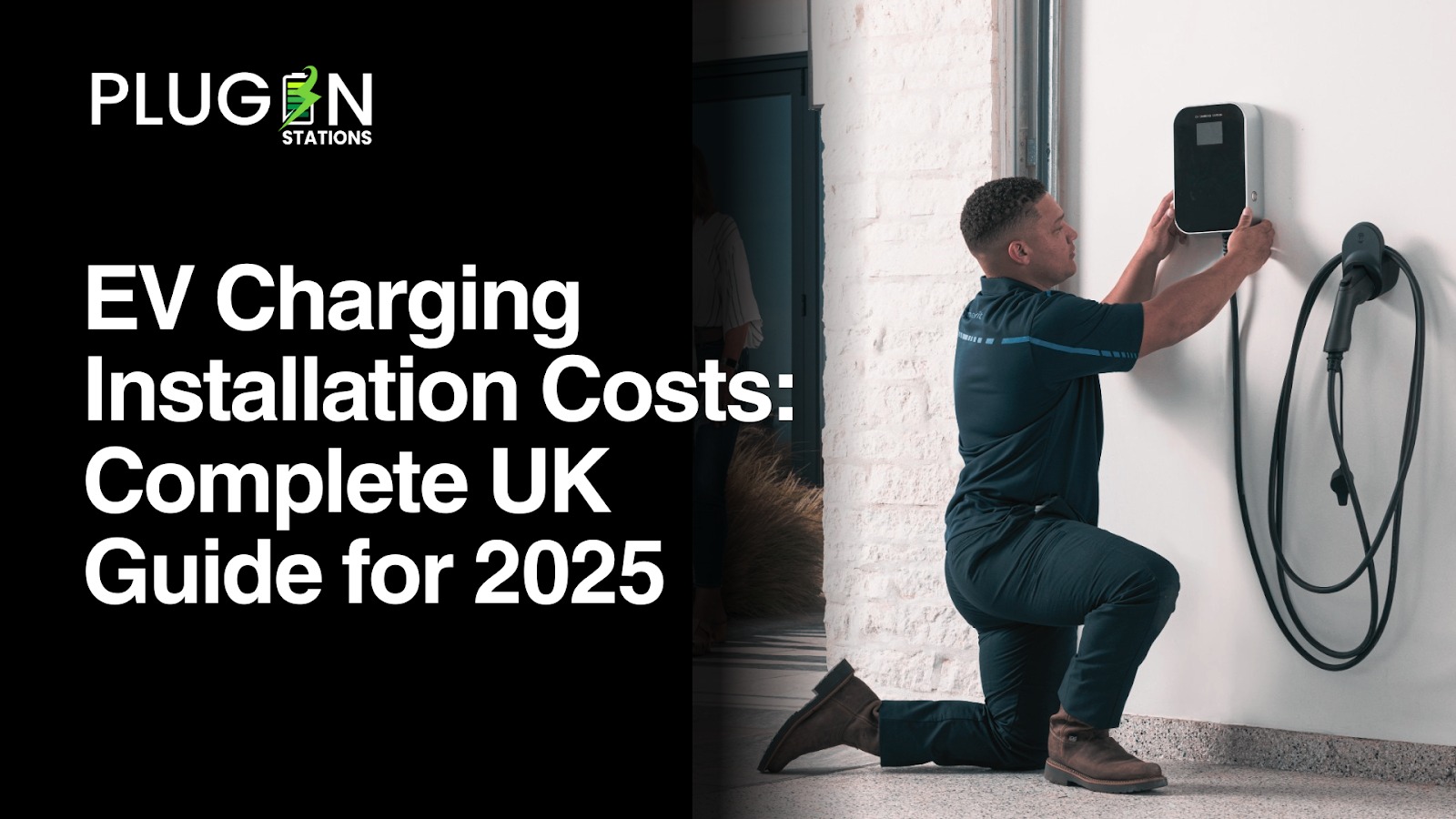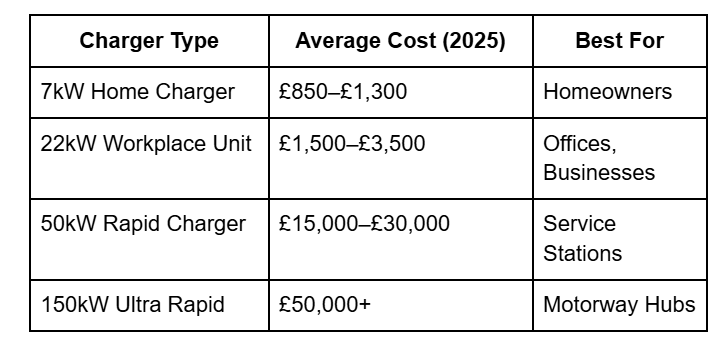
EV Charging Installation Costs: Complete UK Guide for 2025
As electric vehicles continue to dominate the UK car market, the demand for reliable charging solutions is higher than ever. Whether you’re an EV owner looking to charge at home, a landlord installing chargers for tenants, or a business providing charging points for customers, understanding the EV charger installation cost in the UK is crucial.
In 2025, installation prices have stabilised, but costs can still vary significantly depending on the type of charger, property setup, and additional requirements. This comprehensive guide will break down the home charging installation price and commercial costs, the factors that affect pricing, and how to save money using government grants.
Why Installation Costs Matter
Buying an EV charger is only half the expense; the other half is installation. In fact, the cost of fitting and configuring your charger can sometimes match the hardware price. Having a clear idea of the UK EV installation cost in 2025 ensures you budget accurately and avoid hidden charges.
Average EV Charger Installation Costs in the UK (2025)
While prices vary, here are the general averages for 2025:
- Home EV Charger (7kW smart charger): £850 – £1,300 (including installation)
- Faster Chargers (22kW workplace charger): £1,500 – £3,500 per unit
- Commercial Rapid Chargers (50kW+): £15,000 – £30,000 per unit
- Ultra-Rapid Public Chargers (100kW–350kW): £40,000 – £100,000+ per unit
For most homeowners, the typical cost of installing a 7kW smart charger remains around £1,000–£1,200 in 2025.
What’s Included in Standard Installation?
When you hire an OZEV-approved installer, the standard package usually covers:
- Charger unit mounting (on wall or pedestal)
- Up to 10 meters of cabling
- Connection to the consumer unit (fuse box)
- Safety testing and certification
- Mobile app setup for smart chargers
Anything beyond this is considered a non-standard installation and incurs extra charges.
Factors That Affect EV Installation Costs
1. Charger Type and Speed
- Slower chargers (3.6kW) cost less but take longer to charge.
- 7kW smart chargers are most popular for UK homes, balancing speed and price.
- 22kW chargers require a three-phase power supply, adding cost.
- Rapid chargers (50kW+) are usually reserved for public stations due to high installation expenses.
2. Property Type and Wiring Setup
Older homes may require:
- Fuse box upgrades (£200–£500)
- Earthing improvements for safety
- Cable routing through walls or long driveways (extra labour)
Flats or apartments may need landlord approval and additional cabling, increasing costs.
3. Electrical Load Capacity
Installers must ensure your home or site can handle extra EV load. If upgrades are needed:
- Main supply upgrade: £500–£1,000
- Three-phase upgrade (for 22kW chargers): £2,000–£5,000
4. Installation Location
- Wall-mounted chargers are cheaper than pedestal-mounted.
- Outdoor installations may require waterproofing, trenching, or additional safety measures.
5. Additional Features
- Smart charging apps and connectivity
- Load balancing systems
- Solar integration
- Battery storage compatibility
Each of these adds to the upfront price but can save money long term.
Hidden Costs to Watch Out For
When budgeting for home charging installation price in 2025, don’t forget:
- Extra cabling beyond 10m: £10–£20 per metre
- Fuse board replacement: £300+
- Groundworks for driveways: £500–£1,000
- Parking bay signage for commercial installs: £100–£300
Always ask your installer for a detailed cost breakdown before committing.
How Long Does Installation Take?
- Home installations: 3–5 hours on average
- Workplace installations: 1–2 days, depending on the number of chargers
- Public rapid chargers: Several weeks (due to grid connection and groundwork)
Cost Comparison: Home vs Commercial Charging

How to Save Money on EV Charger Installation
1. Apply for Government Grants
The UK offers OZEV grants (more details in Blog 3) that reduce installation costs by up to 75% for eligible users.
2. Choose an OZEV-Approved Installer
Using a government-approved installer ensures quality, safety, and grant eligibility.
3. Bundle Installation with Hardware
Many suppliers offer discounts if you buy the charger and installation together.
4. Plan Ahead
Simple setups (like mounting a charger near your fuse box) are cheaper. If possible, avoid long cable runs or unnecessary civil works.
Real Examples of Installation Costs in the UK
- Case 1: Homeowner in Birmingham
Installed a 7kW smart charger in their driveway. Cost: £1,050 (after OZEV grant). - Case 2: Small business in Leeds
Installed 4 workplace chargers with load balancing. Cost: £8,500 total. - Case 3: Service station in Kent
Installed 6 rapid chargers. Cost: £150,000, partly offset by commercial grants.
These examples highlight the wide variation in UK EV installation costs depending on project scale.
FAQs on EV Charger Installation Costs in 2025
Q1: What is the cheapest way to install a home EV charger?
Choose a 7kW smart charger with standard installation near your fuse box and apply for an OZEV grant.
Q2: Can I install an EV charger myself?
No. UK law requires installation by a qualified, OZEV-approved electrician.
Q3: Do I need planning permission?
Not usually for homes, but landlords and commercial sites may need approval.
Q4: Are workplace installations tax-deductible?
Yes, businesses can claim incentives and capital allowances for charging infrastructure.
Q5: How much more do rapid chargers cost?
At least 10x more than home chargers due to equipment, civil works, and grid upgrades.
In summary
In 2025, the EV charger installation cost in the UK depends on several factors: charger type, property setup, and extra electrical requirements. For most homeowners, expect to pay around £1,000 for a 7kW smart charger. Businesses and public providers will spend more, but can often offset costs with grants and tax benefits.
At Plug In Stations, we provide transparent, hassle-free installation services across the UK. Our team handles everything from site surveys to grant applications, so you get the right charger at the right price.
Contact Plug In Stations today to get a free consultation and cost estimate for your EV charging installation in 2025.












